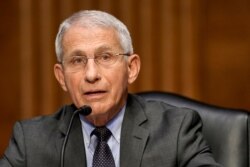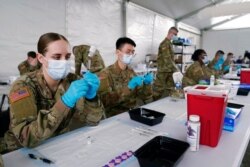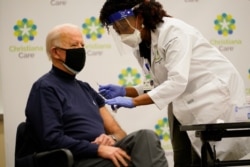With the rate of Americans fully vaccinated for COVID-19 stalling at close to 50%, a growing number of U.S. public schools, colleges and private companies have turned to a controversial legal tool to get more people immunized: vaccine mandates.
Nearly 600 colleges and universities will require students, faculty and staff to be vaccinated before returning to campus in the fall, according to the Chronicle of Higher Education, while some public school districts are mandating teachers and administrators to provide proof of vaccinations. Many private businesses have also announced vaccination requirements for employees.
With experts saying 70% or more of Americans need to be vaccinated or immune to COVID in order for the country to achieve "herd immunity," mandatory vaccination has emerged as a weapon in the fight against the deadly coronavirus variants.
"I have been of this opinion, and I remain of that opinion, that I do believe at the local level, there should be more mandates. There really should be," Dr. Anthony Fauci, the White House chief medical adviser, said on CNN recently. "This is serious business. So I am in favor of that."
Yet the effort faces pushback, and not only from militant anti-vaccine activists.
In recent months, lawmakers in Republican-controlled states have introduced more than 100 bills that would ban school and employer vaccination mandates as well as so-called vaccine passports for travel and other services, according to a tally by the National Academy for State Health Policy. Nearly 10 of these bills have been signed into law in states such as Arkansas and Tennessee.
At its core, the controversy over vaccine mandates pits proponents who say they are the only way to get millions more adults and children inoculated, and opponents who see them as an infringement on personal freedoms and potentially dangerous.
"Bullying and punishing people for exercising the human right to voluntary, informed consent to vaccine risk taking is an abuse of public trust," said Barbara Loe Fisher, president of the National Vaccine Information Center, an anti-vaccine group.
While schools' authority to require vaccinations was settled long ago by the courts, questions are being raised about whether other institutions — from the federal government and military to the private sector — can compel people to be vaccinated.
Here is a look at that thorny legal and constitutional debate.
What exactly can the federal government do to impose vaccine requirements?
The federal government has never instituted a blanket national vaccine mandate, and it's unclear whether it has the authority to do so, according to legal experts. Nor does it have the power, experts say, to direct states to make vaccination compulsory.
But that's not to say the government can't "start setting some expectations" toward a national vaccination policy that could materialize if the pandemic worsens significantly, said James Hodge, director of the Center for Public Health Law and Policy at Arizona State University.
"Who could the federal government tell directly you must be vaccinated? Federal employees, federal contractors, anybody doing business with the federal government," Hodge said in an interview.
Military personnel, too, can be required to get vaccinated, Hodge said. Although the military has thus far made vaccination optional, "I think soon we'll start to say, 'You need and will be vaccinated, period, as far as your military service,'" Hodge said.
President Joe Biden pledged that he would not make vaccinations mandatory in the military. However, that could change depending on circumstances, and he could waive an "informed consent requirement" for members of the military, according to Mark Nevitt of the Syracuse University College of Law.
Another weapon in the government's arsenal: spending power. Although the government can't force a mandate on states, it could encourage them to require vaccination as a condition of receiving free vaccine shots, Hodge said.
What about state and local authorities?
Under the U.S. federal system, states are primarily in charge of public health matters as part of their "police power." As far back as the early 20th century, the Supreme Court has recognized that this power extends to mandating vaccinations for certain classes of residents, according to a recent report by the Congressional Research Service.
Using this authority, all 50 states currently require vaccines for measles, mumps, flu and other diseases for school attendance, though exemptions are made on religious and medical grounds.
Yet states can't require vaccinations for their entire populations. Nor can local jurisdictions such as towns and counties, which take their direction from state governments, according to Hodge.
Instead, residents can be required to get vaccinated as a condition of engaging in a variety of activities, from attending school to going to a football game and traveling by train or plane, according to some legal experts.
"That's what we call a vaccine mandate," Hodge said.
Can businesses force employees to get shots?
Generally, private businesses are allowed to mandate vaccines as long as they exempt employees who can't get shots for medical reasons or because of religious belief.
Even before the pandemic, some private entities such as hospitals required vaccines such as flu shots. But states can also ban the practice, as some have done in recent weeks.
In May, the U.S. Equal Employment Opportunity Commission announced that federal laws "do not prevent an employer from requiring all employees physically entering the workplace to be vaccinated for COVID-19, so long as employers comply with the reasonable accommodation provisions" of federal anti-discrimination statutes.
Courts have also recognized private employers' right to mandate vaccinations. Last month, a federal judge tossed out a lawsuit brought by more than 100 former employees of a Texas hospital who were fired after refusing to get vaccinated.
Yet legal challenges to vaccine mandates have continued, and businesses remain wary. In a March survey, just 3% of corporations said they would mandate vaccines, with the majority saying they'd encourage employees to get vaccinated.
What is the legal hang-up for issuing vaccine inoculation mandates?
All three COVID-19 vaccines currently in use in the United States — developed by Pfizer/BioNTech, Moderna and Johnson & Johnson — have been authorized for use by the Food and Drug Administration on an emergency basis but haven't received full approval.
Under federal law, persons receiving an "emergency use" medical product must be given "the option to accept or refuse." This means anyone can refuse to take the shot and, therefore, some critics have argued, emergency use vaccines can't be mandated. That has been one of the major factors in the Pentagon's decision until now to keep vaccinations on a voluntary basis.
This week, Ohio governor Mike DeWine signed a bill that would prohibit schools from mandating the emergency use vaccines. But the issue is likely to become moot once the FDA fully approves the vaccines. Moderna and Pfizer announced on Friday that the FDA will review their applications for full approval by January.








